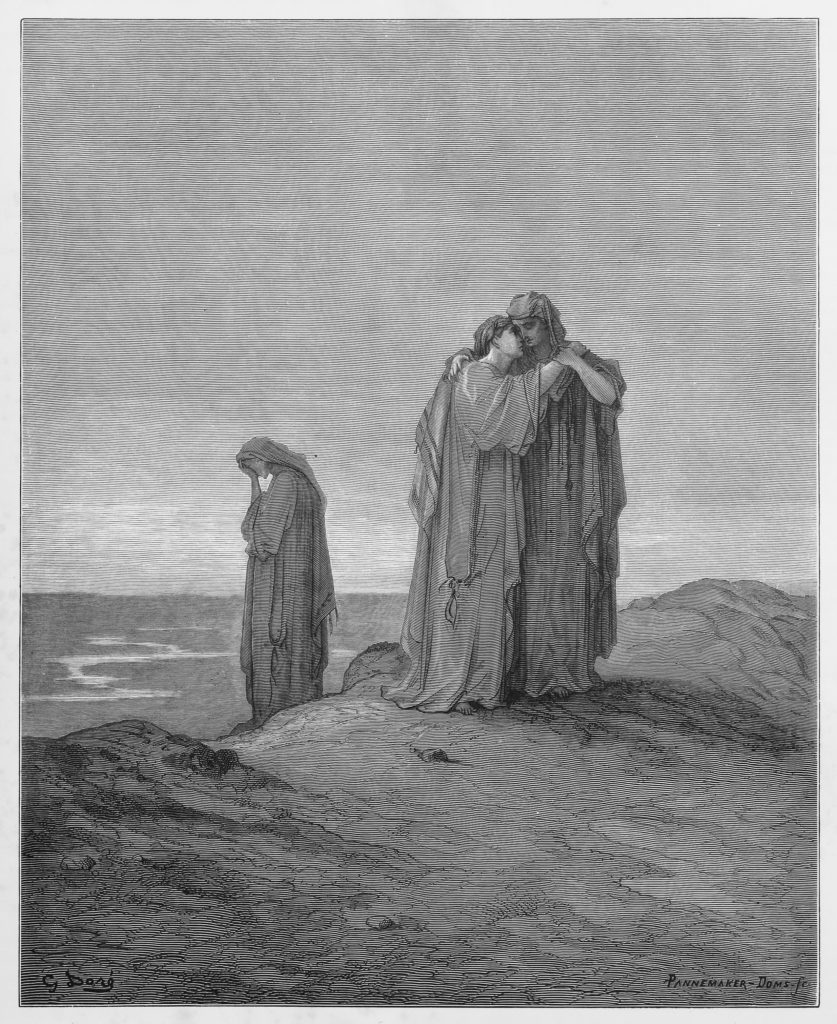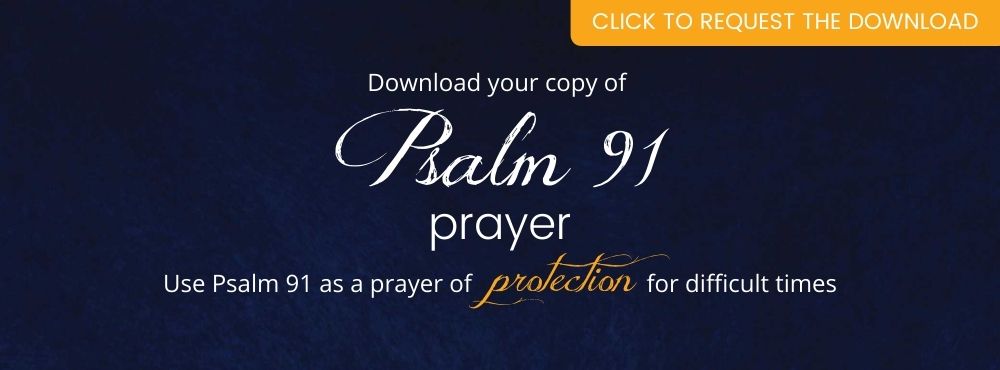The Story of Ruth: Hope
If pressed, most of us would probably offer Ruth’s name as one of the first five or ten women of the Word whose name and story we remember. Yes, there was Deborah, a fierce judge of Israel before the kings; there was Hadassah, renamed Esther, who became queen and saved her people; Mary, the mother of Jesus; and dozens of other important women. Yet, somehow, Ruth’s story is unique…
Join us as we discover Ruth’s story and how she found—and we can find—hope!
Who was Ruth?
Ruth, unlike most women that we have studied in the Word, was not an Israelite. In earthly terms, she was not even what we might consider a candidate for the genealogy of Jesus. After all, Ruth was from Moab; often an enemy of Israel. She served the god of Moab, Chemosh, for many years of her life… possibly up to the time she declared her love and loyalty to stay with Naomi, making Naomi’s God her own as well. It was Ruth’s entreaty to Naomi that tradition holds as Ruth’s conversion.
Furthermore, it is believed by many, through oral tradition, that Ruth was a high-ranking Moabitess! Likely the granddaughter of Eglon, king of Moab, great-great-granddaughter of King Balak, who had unpleasant dealings with Moses.
Some even believe she may have been a priestess to the false god, Chemosh; and the simple knowledge that she grew up in a world of idolatry means that she should not have been an easy covert to the I AM. Though marrying a Benjamite and living with his family, as well as remaining with her mother-in-law after his death, would have paved the way for her new beliefs…
Still, when we consider all of these things together, it is staggering that Ruth was able to choose God… and it is a testament to the love and wonder of God that He chose her to be in the lineage of Jesus!
But, even after Ruth chose Naomi’s God, her journey did not suddenly become easy. Loyalty to her new God and mother-in-law would cost her. And in journeying out of Moab to the land of Israel and tribe of Benjamin, what Ruth once knew was wholly left behind.
Ruth left knowing she would almost certainly never see her own family again. And while Ruth’s decision certainly came from her love for Naomi, it was connected just as strongly to her love for the God of the Israelites.
Ruth’s Journey

Ruth’s journey begins after she was widowed. When her security and hope were well-tested…
Having buried her husband, Mahlon, Ruth followed her mother-in-law, Naomi, despite Naomi’s repeated attempts to have her turn back; to return to her family.
“…Naomi said, ‘Turn back, my daughters; why will you go with me? Are there still sons in my womb, that they may be your husbands? Turn back, my daughters, go—for I am too old to have a husband. If I should say I have hope, if I should have a husband tonight and should also bear sons, would you wait for them till they were grown? Would you restrain yourselves from having husbands? No, my daughters; for it grieves me very much for your sakes that the hand of the Lord has gone out against me!’”
—Ruth 1:11-13
Yet, Ruth refused to turn back. Unlike her sister-in-law who kissed Naomi goodbye, Ruth clung to Naomi. Ruth rejected the ‘better’ path for love and faith.
Through this, we quickly learn of Ruth’s determination, her love for Naomi, and of course, her love for God. And it is this love and determination that created within Ruth a hope for the future, even when things appeared hopeless to Naomi…
No longer wishing to serve the false god she once did, and wanting to care for Naomi, Ruth followed Naomi for what, in the natural, was probably only a few day’s journey. However, in her heart the journey would have been long, firm in the knowledge that she would never likely see her family or friends again… that she was moving into unknown places and seasons.
“But Ruth said:
‘Entreat me not to leave you,
or to turn back from following after you;
for wherever you go, I will go;
and wherever you lodge, I will lodge;
your people shall be my people,
and your God, my God.
Where you die, I will die,
and there will I be buried.
the Lord do so to me, and more also,
if anything but death parts you and me.’”
—Ruth 1:16-17
This one decision, to let love guide her actions, meant she left everything, but her hope was not diminished. Her heart knew the glory of following God and of doing right by her mother-in-law, who had lost her own family. As far as we know, Ruth never regretted or questioned this decision…
The thought that Ruth did not complain or second-guess her decision, even upon arriving in Bethlehem where she faced many hardships beyond Naomi’s poverty, is beyond what our flesh-filled logic might deem normal. Even Naomi’s own bitterness was not enough to dampen Ruth’s hope and faith…
Ruth took everything in stride. She did not try to get Naomi to work, or even call upon her old friends and relatives for food. Instead, she eagerly went out into the fields to glean. She supported Naomi without ridicule or pride, working for the majority of every harvest day in the hot sun.
It was Ruth’s heart of love and hope that first caught the attention of Boaz. Ruth did not shout what she was doing for her mother-in-law, yet the tale of kindness still reached Boaz. Her heart commanded attention.
“And Boaz answered and said to her, ‘It has been fully reported to me, all that you have done for your mother-in-law since the death of your husband, and how you have left your father and your mother and the land of your birth, and have come to a people whom you did not know before. The Lord repay your work, and a full reward be given you by the Lord God of Israel, under whose wings you have come for refuge.’”
—Ruth 2:11-12
Thus, Ruth found favor in the eyes of Boaz. He ordered his men to leave extra barley stalks for her as they gathered and to give her water. And Boaz himself saw to it that she was fed and well while in his fields, and that no one chastised her.
Yet, further still, as the harvest neared its end, when Naomi told Ruth to go to the threshing floor at the end of Shavuot, Ruth found favor again. For Ruth listened to her mother-in-law and went to Boaz on the threshing floor after he ate and drank his fill, lying at his feet as he slept. Thus, when he awoke and asked who was there, Ruth replied that it was his maidservant, Ruth. Moreover, she asked him to take her under his wing—she asked him to redeem her! She had hope for a favorable outcome!
Yes, her mother-in-law had told her to go lay at Boaz’s feet, and Ruth would have likely understood what that implied… yet Ruth used the language of the Israelites. Ruth spoke so that Boaz might understand; choosing to honor Naomi by doing her will, rather than trying to seek a younger, wealthier husband. Because of Ruth’s obedience, she found favor in the sight of Boaz… so while Boaz had to give another relative first choice, Boaz still knew how it would end. He knew what the answer would be and did not shy away from Ruth’s request, not merely because of Ruth’s relationship to Naomi, but because Ruth was a woman of character.
Boaz did not try to make Ruth sound more enticing. He did not try to sway his relative to take her, gladly doing so himself because of her character—because her hope was secured in God.
Therefore, Boaz redeemed Ruth, and she became his wife, and together they had a son named Obed, who would become the grandfather of King David. Further, Ruth was in the lineage of Jesus! Completing a story that in the natural would have seemed impossible if told beforehand, yet it was a Godly design of faith, hope, and love.
“Therefore my heart rejoiced, and my tongue was glad; moreover my flesh also will rest in hope.”
—Acts 2:26
Ruth’s Hope Examined
- Ruth had enough hope in Naomi and God to not return home as soon as her husband died
- Ruth had continued to hope in Naomi and God. Enough to follow Naomi far from her home and family to a land she knew not; enough to conquer Naomi’s hopelessness.
- Ruth had enough hope in Naomi and God to live hand to mouth. She had enough hope to go to the fields to glean for herself and her mother-in-law, instead of gathering enough for a journey back to Moab.
- Ruth had enough hope in Naomi and God to go to Boaz. Enough hope to listen to the words of those she trusted and ask a difficult thing of Boaz… to do what, in earthly eyes, was desperate and unlikely to succeed.
- Ruth had enough hope to accept a destiny of favor—a new life
Because of Ruth’s hope, she found that in the end she was given great favor—indeed, greater favor than she likely ever imagined. She went from gleaning the fields, feeding herself and her mother-in-law, to being redeemed! To being in the lineage of our Redeemer!
What Can We Learn from Ruth?
Without hope, we cannot persevere or have faith, because hope allows us to keep going when everything around us says ‘it will not work.’ Hope is the cornerstone of our faith—even our love.
Faith, hope, love, and perseverance are traits Ruth displayed… and it was through them that God brought her to the notice of a redeemer. Ruth loved Naomi and God, and these brought forth an outpouring of faith, hope, and perseverance!
If we do not hope—but instead focus on hopelessness—then we soon doubt, eventually giving up. This is not what God desires for us! After all, Jesus said that the three greatest things are faith, hope, and love. It was out of Ruth’s love that hope flowed, and out of that hope that faith flowed.
Love is the basis of all these, so if we desire to place our hope in the Lord, we have to love Him.
We have an amazing God, One who loved us before we were born. One who never leaves us nor abandons us… even if we abandon Him. In loving Him, we open ourselves up to faith and hope. In loving Him we are able to persevere through all things. We are well able to love Him. So let us walk in that love, allowing wonderful things to follow.
Let us love the One who first loved us!
